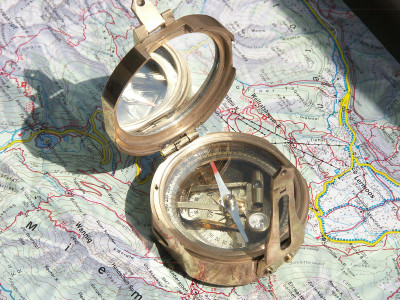
In a relatively controversial reveal, researchers recently found that on average, men might actually have a better sense of direction than women.
A study released Monday by researchers at the Norwegian University of Science and Technology explored the differences between men and women’s spatial reasoning abilities. By employing fMRI, or functional MRI, the researchers found that men’s sense of direction “was more effective,” according to the release.
“Basically, [fMRI] is a procedure used to image activity in the brain,” said Elizabeth Boskey, a lecturer in Boston University’s College of Arts and Sciences. “People are asked to do a task while in an MRI machine and the machine is able to look for areas of increased or decreased activity in the brain.”
The study was conducted in two parts, according to the release. First, researchers had 18 men and 18 women learn a virtual maze’s layout before having the subjects perform several navigation tasks, such as finding “the yellow car,” in an MRI scanner via 3D goggles and a joystick. The male subjects were able to solve 50 percent more of the tasks than the women.
“It follows the pattern that men tend to use cardinal directions more and allocentric spatial location as if it were on a map, whereas women are more likely to use landmarks to guide them along routes,” said Michael Hasselmo, a professor in CAS.
In the second part of the study, the researchers divided 42 women into two groups and gave one group testosterone using a double-blind method. This meant that neither the researchers nor the women knew which group was assigned what treatment — testosterone or placebo. The women treated with testosterone were not able to solve more tasks than the control group, but had an improved amount of knowledge of the maze’s layout.
“It certainly seems to be the case that hormones would have an effect on our cognitive abilities because they help us do a lot of things,” said Liz Chrastil, a postdoctoral researcher at BU. “They regulate neurotransmitters, they regulate growth, things like that. They are certainly involved with cognition in a somewhat indirect way.”
Though the study aimed to analyze varied abilities of spatial reasoning, research related to the effect of hormones on cognitive processes extends further, Hasselmo said. Therefore, knowledge on the effects of differing levels of hormones could be applied to the field of neuroscience as a whole.
“There has been active research trying to determine whether or not hormones can influence progression of disease like Alzheimer’s disease,” Hasselmo said, “and, for instance, whether the hormone estrogen could slow progression of Alzheimer’s disease and whether maybe decreases in estrogen levels after menopause could accelerate it.”
While the research on hormones shows promise, Boskey said that the method used to choose the subjects was not representative of the entire population’s abilities.
“What we don’t know is how [spatial reasoning] actually differs in population groups of men and women, because unlike what the press release of this study shows, there was actually no examination of male reasoning in the [second part of the] study,” she said. “The study population was entirely women.”
And though the results were statistically significant, Chrastil also added that the results are not indicative of the entire population due to natural variability.
“There are a lot of individual differences within men and within women, so we see a lot of overlap sort of in the middle,” she said. “There are a lot of women who are very, very good at navigation and a lot of men who are very, very poor at navigation. There tends to be more variability within men, usually.”
Hasselmo added, “It’s just on average that the means are slightly different.”
A potential reason behind the study’s results, Boskey said, might be that women are often taught they are worse at spatial reasoning through outside voices and pressures.
“One thing that’s important to note is that a lot of these tasks are affected by social constructions of gender, not just biology,” she said. “So if you tell women before doing a task that women are good at the task, they tend to do better than if you tell them it’s a task that men do better at.”
Society’s interest in gender differences are also a driving force behind these studies in the first place, the BU experts said. Whether through magazine articles or in the news, the public often expresses its desire to learn more about the subject.
“I think people just want to understand what makes individuals unique,” Chrastil said.
Boskey expanded on Chrastil’s comment, drawing attention to the existence of similar inquiries in other scientific areas as well.
“I think that people are always looking for reasons to explain gender differences in behavior in terms of biology,” Boskey said. “It is a fascinating topic and you see it across various fields from evolutionary biology to psychology to anthropology.”
This eagerness to find an explanation, however, has the potential to lead both researchers and the public to jump to conclusions about gender differences, Boskey said. Therefore, it is important for those reading similar studies to take the information with a grain of salt, and avoid making false claims.
“It’s a very messy thing, and there’s a tendency to over-interpret these results that come from social biases about gender,” Boskey said, “when in fact the social biases may be affecting the results more than any biology.”


























































































































